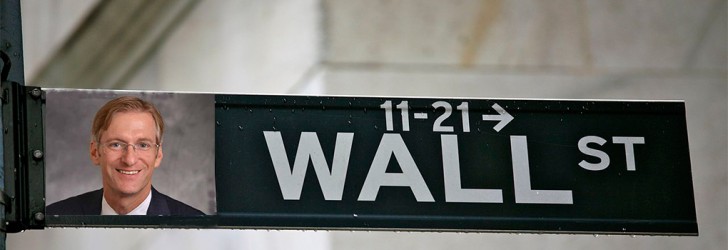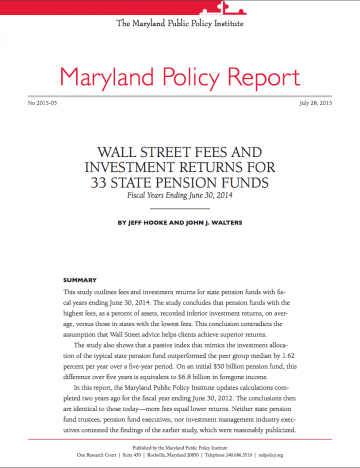Wheeler’s Treasury Legacy Had High Costs Compared to Performance
Thursday, March 03, 2016

If Ted Wheeler’s leadership of Oregon’s pension system is an indication of how he will manage Portland, the City may have the high costs compared to performance.
According to a recent Maryland Public Policy Institute study, "pension funds with the highest fees, as a percent of assets, recorded inferior investment returns, on average, versus those in states with the lowest fees.” Oregon’s PERS had among the highest fee ratio paid to Wall Street under Wheeler’s leadership.
Under Wheeler, Oregon's Public Employee's Retirement System (PERS) has paid billions to Wall Street private equity firms and had the fifth highest Wall Street fee ratio in the country, according to the Maryland Public Policy Institute study.
“For the five years ending June 30, 2014, we were unable to find a positive correlation between high fees and high returns. In fact, we found a negative correlation. This is not a glowing endorsement for Wall Street advice, reminding one of author Fred Schwed Jr.’s critique of Wall Street, when he asked, 'Where are the customer’s yachts?” said the report.
Not only are the fees paid to Wall Street private equity firms in the billions, but both the Maryland Public Policy Institute Study co-author and a top pension watchdog raise concerns that the true amount being paid to Wall Street firms is not being disclosed.
Underreporting Fees
In an interview with GoLocalPDX, the Maryland study’s co-author Jeff Hooke said, “I think more than likely Oregon’s fees are understated. I don’t think they are disclosing performance fees or other things like that.”
The report states, “Based on our work, we conclude that a number of states are not reporting fees properly. Misreporting may be a particular problem with private equity and hedge fund investments, where managers often deduct fees before sending cash returns.”

Each year Institutional Investor names the 40 most influential in the investment industry. The list includes Governors like Bruce Rauner of Illinois and Chris Christie of New Jersey, GE CEO Jeff Immelt -- and both Wheeler and Siedle.
Siedle in a phone interview agreed with Hooke that under Wheeler, there has been a lack of transparency of fees being paid to Wall Street. “It certainly looks to be a problem. Their (Oregon’s) Treasury ought to disclose all of the fees," said Siedle.
The amount withheld by Wall Street firms is unknown and is unreported by Wheeler’s office.
Oregon PERS Funding Level is Strong, But Performance Could Be Stronger
Three of the most important factors to the health of a pension system is the funding level of the liability of the obligation, the performance of the fund, and the cost of the investment. Each is inextricably linked to one another.
Pew Charitable Trust’s 2015 report which tracks each state system finds that as of 2013 (the most recent data available) Oregon’s system was 96% funded. Pew finds the average funding level of the state pension systems is 72%. The low unfunded liability level is functionally set by statute in Oregon.
As for the performance and relative cost, both Hooke and Siedle agree that the performance of the Oregon pension system could be dramatically improved by shifting away from high fees tied to private equity and hedge funds. Both advocate that Oregon’s PERS should consider shifting to an indexing approach.
“Most state governments should consider indexing," said Hooke. "That carries a lot less in fees and the returns are comparable, and perform often even better than investments with a lot of fees attached. Only one state does that now and that’s Nevada, and they’ve done well for themselves since they switched to an index."
“There are always alternatives to consider. Indexes would probably be a good metric to measure against to see whether Oregon should consider other investment ideas,” said Siedle who run the forensic pension firm Benchmark Fiancial.

If a fund had invested $50 billion in the replicating index on June 30, 2009, by June 30, 2014, five years later, it would have had $98.2 billion, assuming reinvestment of dividends. The same $50 billion investment in the median state fund portfolio would have been worth $91.4 billion, indicating a $6.8 billion shortfall.
“Oregon is actually doing better than the average in terms of returns. They’re paying more but actually doing a little better than average in returns,” said Hooke. “The question for them is actually whether or not they could achieve the same results by indexing and not having to pay any fees, and the answer to that is yes they could.”
Missed Opportunity
Some might see Wheeler's approach as safe, but the experts argue the cost is too high and there is a significant missed opportunity. "They could be doing even better. They could be paying less fees. This is not an either/or proposition, keep in mind. By using indexes, state funds would be both getting better returns and paying less in fees," said Hooke.
"That's what they will use to try to say the investment fees are worthwhile. That, "Look we are paying high fees but we're above the average in terms of returns', but that doesn't really answer the question," said Hooke.
Related Articles
- 16 To Watch in 2016: Ted Wheeler
- Did Wheeler Have an Ethical Obligation to Disclose His 10 Years of Banking & Investment Experience?
- COMING WEDNESDAY: Treasurer Ted Wheeler and Wall Street
- Can Jules Bailey Challenge Ted Wheeler?
- Big Money Limits on Campaign Donations in Portland, But Wheeler Has Massive Lead in Cash
- Is Ted Wheeler the New Sam Adams?
- NEW: Hales Says Wheeler Should Focus on His Job in Salem
- NEW: Wheeler Slams Hales on Portland’s Rape Kit Backlog
- Is Ted Wheeler Winning the Fundraising Battle Against Charlie Hales?
- Hales Gets Blindsided as Former Mayor Katz, Potter and Adams Endorse Wheeler
- Hales, Wheeler Split on Novick’s Gas Tax Proposal
- Hales, Wheeler Voice Support for Minimum Wage Increase
- How Ted Wheeler Could Unseat Charlie Hales in 2016
- BREAKING: Ted Wheeler Challenges Mayor Charlie Hales to 12 Debates
- Can Bailey Compete with Wheeler’s Fundraising?
- Can Jesse Cornett Challenge Ted Wheeler in the Mayor’s Race?
- Governor Brown Declares Drought Emergencies in Baker and Wheeler Counties
- Hales Flip Flops on Out of State Money; Wheeler Takes it Too
- NEW: Facebook Page Calls for Ted Wheeler to Run For Mayor of Portland
- Wheeler Unveils New Homelessness Plan - Big Scope, No Budget or Timeline
- Wheeler’s Bios Over 20 Years - The Often Missing Banking Experience
- Wheeler’s Top PERS Private Equity Firm Has Earned $125M While Paying $30M SEC Penalty
- Where is Wheeler’s Challenger?
- Spotted in Portland: Charlie Hales and Ted Wheeler at Blue Collar Baking
- Scott Bruun: Ted Wheeler’s Wheel of Big Government Solutions
- Coming Thursday - How Has the Oregon’s PERS performed Under Wheeler’s Leadership
- Could Wheeler Be Vulnerable to a Challenge from the Left?
- Wheeler Takes Aim at Oregon DEQ for Arsenic & Cadmium Levels in SE Portland
- Wheeler to Challenge Hales in Race for Mayor of Portland
- Who’s Hot and Who’s Not in Oregon Politics: Ted Wheeler, Charles McGee, Julie Parrish
- Why is Ted Wheeler Speaking at Oregon Mayor’s Conference?
- Why is Wheeler Failing to Disclose His Ten Years as a Banker And Investor?
- Why No Challenger for Wheeler is Bad News for Portland
- Who’s Hot and Who’s Not in Oregon Politics: Ted Wheeler, Tina Kotek, Loretta Smith
- Who Has the Upper Hand in a Debate: Charlie Hales or Ted Wheeler?
- Wheeler Rolls Out Tenants’ Bill of Rights
- Wheeler Says “I Know We Can Do Better” in Campaign Announcement Speech
- Ted Wheeler Signs Working for the People Pledge
- Ted Wheeler Promises To Shelter All Homeless If Elected
- Ted Wheeler Announces He’s Running for Mayor of Portland
- Ted Wheeler Calls for Kitzhaber’s Resignation
- Ted Wheeler Comes Out In Support of St. Mary’s Students
- Ted Wheeler Looks More Like an Incumbent Than a Newcomer
- Wheeler Issues Statement on Gun Violence
- Wheeler Campaign Blasts Hales for “Mismanagement of City’s Growth”
- Wheeler Receives 11 New Endorsements




 Delivered Free Every
Delivered Free Every
Follow us on Pinterest Google + Facebook Twitter See It Read It